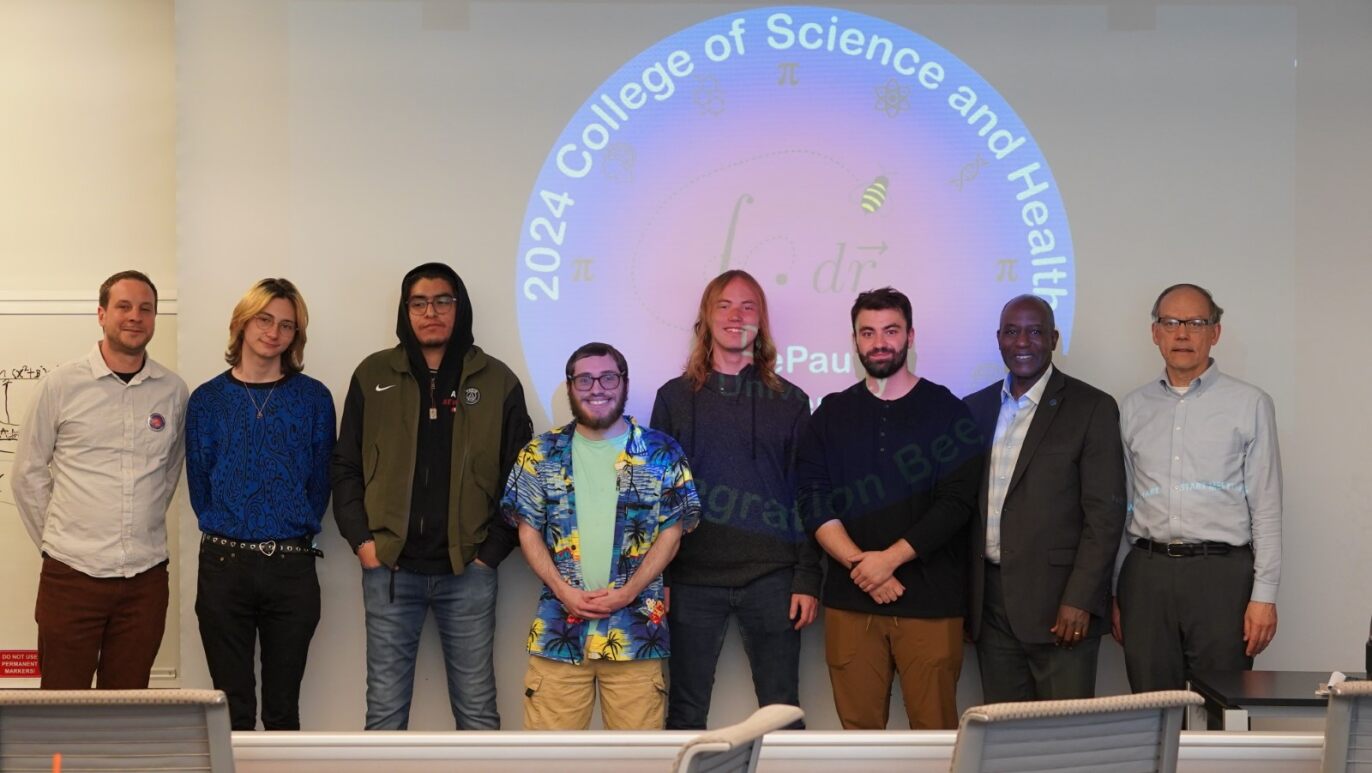 Faculty and student participants in the 2024 Integration Bee.
Faculty and student participants in the 2024 Integration Bee.
In a harmonious blend of intellect, competition, and camaraderie, DePaul University's College of Science and Health (CSH) recently hosted its inaugural Integration Bee. Spearheaded by the
Math Club, the
Department of Mathematical Sciences, the
Idea Realization Lab, and the
Dean's Office, this thrilling event showcased the prowess of students in solving integrals, all while fostering a sense of community within the academic sphere.
The Integration Bee, a new addition to the university's annual calendar, pitted students from a broad array of academic majors against each other in a head-to-head competition, with the challenge of solving integrals against the clock.
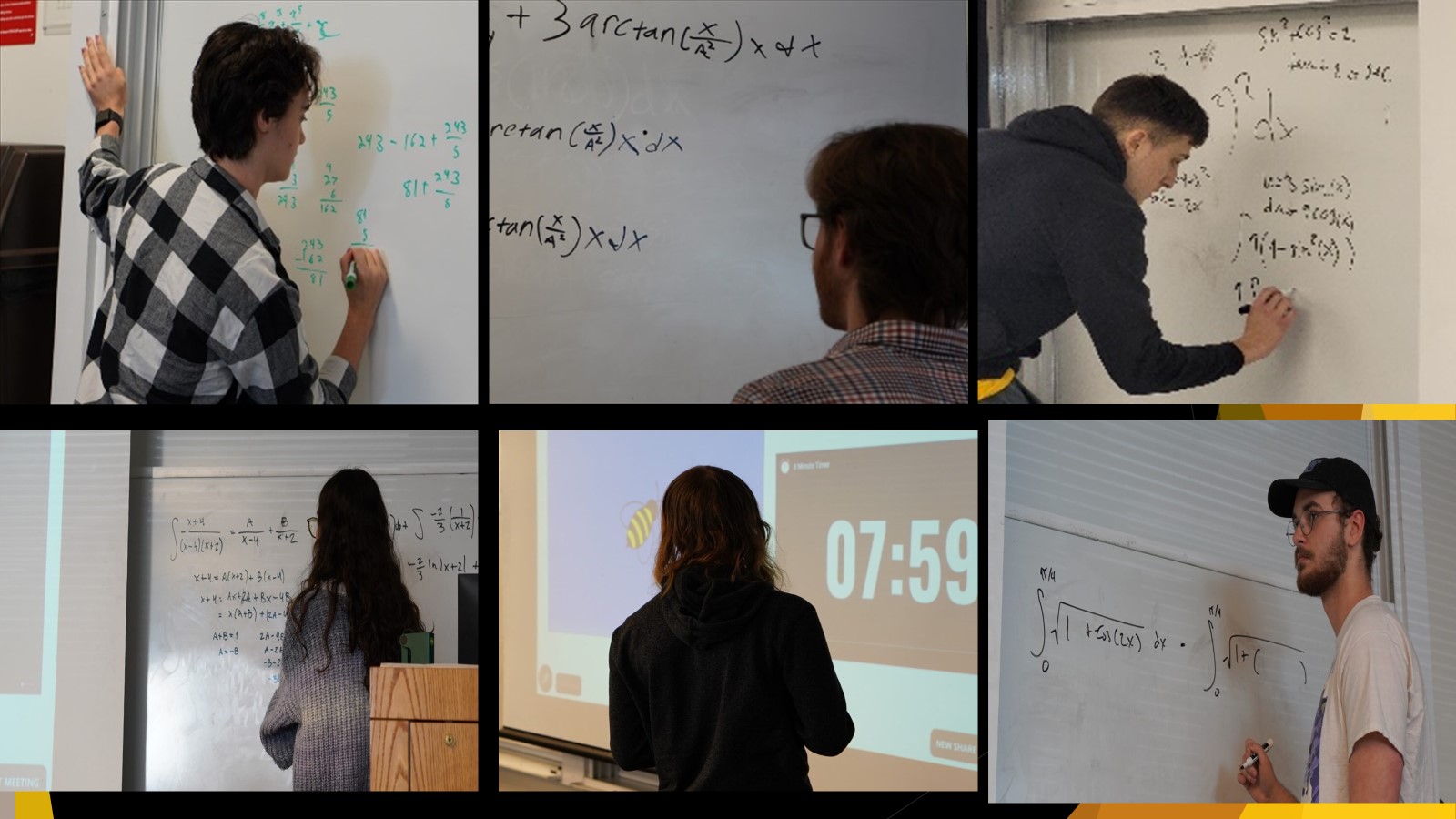 A montage of Integration Bee students.
A montage of Integration Bee students.
This competition has all the energy and thrills of the March madness basketball tournament, and the event adopted a bracket-style arrangement, developed by mathematics student, Joshua Chis, where competitors advanced through successive rounds until an ultimate champion emerged victorious. The problems presented to participants were meticulously curated to escalate in difficulty, ensuring a rigorous test of mathematical acumen.
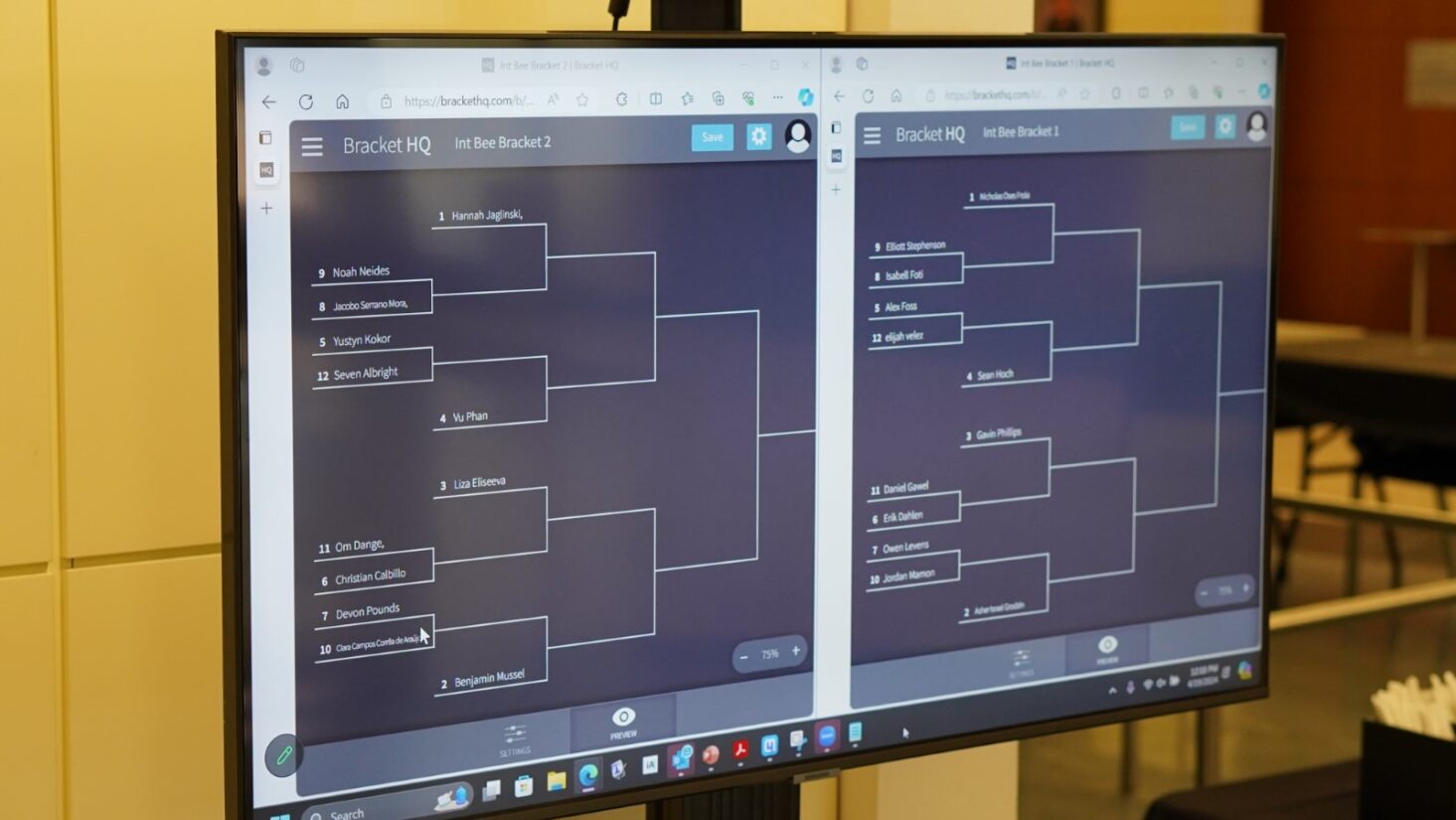 2024 Integration Bee brackets.
2024 Integration Bee brackets.
The ability to integrate is rarely overtly listed in employment advertisements but it's implied in so many ways. For those unfamiliar with the manifestation of integration, calculus integration finds widespread use across numerous industries, including physics, engineering, economics, finance, medical sciences, environmental science, computer science, aerospace, automotive engineering, and telecommunications. In physics and engineering, it's indispensable for analyzing motion, force, and energy. Economists and financiers employ it to model revenue, cost, and profit functions. Medical researchers utilize it to understand biological processes and drug kinetics. Environmental scientists apply it in modeling population dynamics and fluid flow. Computer scientists leverage it in image processing and cryptography, while aerospace engineers rely on it for aerodynamics and vehicle motion. Telecommunications experts use integration for signal processing and network optimization. Across these fields, calculus integration is pivotal for understanding and optimizing systems governed by continuous change and quantities.
What is integration? Imagine you have a contract to sell T-shirts at a Taylor Swift concert and need to determine how much inventory to bring based on several years of data on concert attendance and T-shirt sales. You can use this data to develop an equation that describes the relationship between concert attendance (the number of people attending) and T-shirt sales (the number of T-shirts sold).
Once you have this equation, you can use a mathematical tool called a derivative to find the maximum sales. The derivative helps you understand how sales change as attendance changes. Specifically, it tells you the rate at which sales increase or decrease with respect to attendance. By finding the highest point of this rate, you can determine the maximum number of T-shirts you can expect to sell.
On the other hand, if you want to understand the total number of T-shirts sold over a range of attendance numbers, you would use a process called integration. Integration allows you to calculate the total sales over a specified range of attendance figures. Graphically, this is represented as the area under the curve of the equation that describes the relationship between attendance and sales.
Integration Bees have long been a tradition at prestigious institutions like MIT and the University of California, Berkeley. DePaul University was thrilled to deliver this exciting competition to showcase the incredible talent within its student body. By participating in these bees, students not only reinforce their theoretical knowledge but also develop quick thinking and precision, which are valuable in both academic and professional settings. Moreover, the Integration Bee encourages peer interaction and teamwork, as students often prepare in groups and support one another, thereby cultivating a sense of community and mutual encouragement within their respective department. This blend of competition and camaraderie makes Integration Bee competitions a vital component of a well-rounded college education.
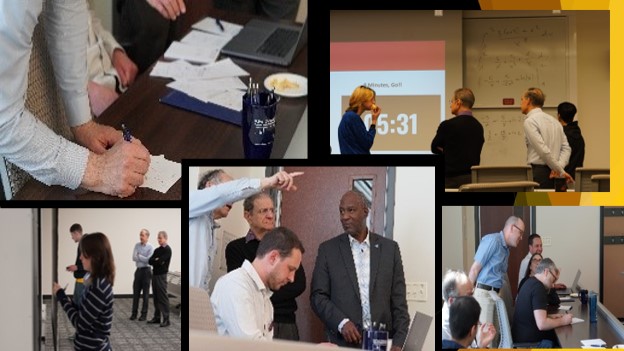 Montage of faculty involved in the 2024 Integration Bee.
Montage of faculty involved in the 2024 Integration Bee.
One of the distinctive features of the DePaul College of Science and Health Integration Bee was the hands-on involvement of faculty members from the Math Department, who proctored the solutions, providing invaluable guidance and mentorship throughout the competition.
This direct engagement with faculty not only elevated the academic experience but also emphasized the collaborative nature of learning within the department.
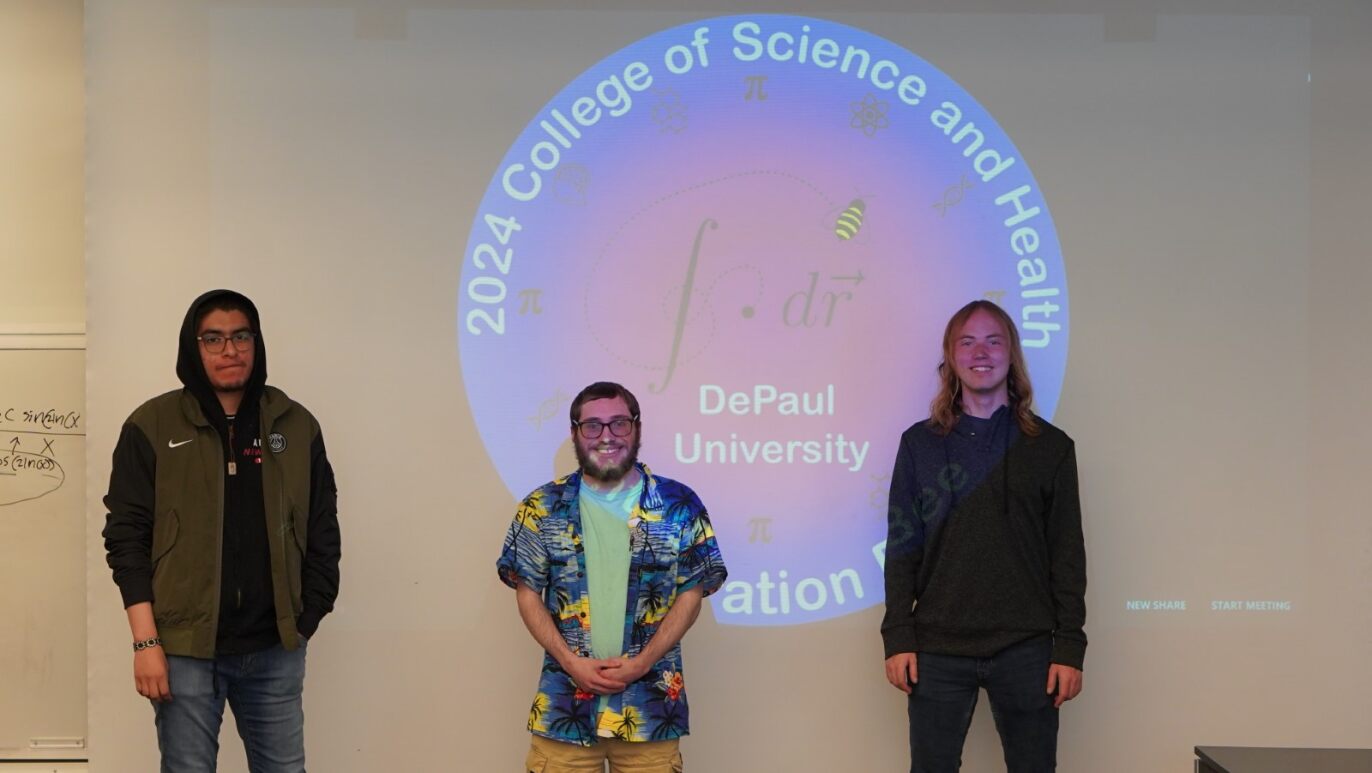 2024 Integration Bee winners: 1st place Asher Godzin (center), 2nd place Christian Calbillo (right) and 3rd place Sean Hoch (left).
2024 Integration Bee winners: 1st place Asher Godzin (center), 2nd place Christian Calbillo (right) and 3rd place Sean Hoch (left).
In addition to the thrill of competition, the Integration Bee offered substantial incentives for participants. Congratulations to the first-place winner Asher Grodzin awarded a prize of $500, with $200 and $100 prizes to Christian Calbillo and Sean Hoch for second and third place.
However, beyond the material rewards, the event fostered a palpable sense of community and collective joy among attendees. Although a competition, almost all participants took time to review their integration techniques in groups, knowledgeable that group members may be matched head-to-head in the Bee.
When asked about their motivation for attending the Integration Bee, one student shared, "I attended the bee because I wanted to challenge myself and see how I stack up against my peers. But beyond that, I also wanted to be part of this vibrant community of mathematicians and problem-solving enthusiasts., because nerds rule the world"
Dr. Kyle Petersen, Chair of the Math Department, emphasized the relevance of teaching calculus and integrals in today's world, stating, "Calculus and integrals form the backbone of many fields, from engineering to economics. Mastering these concepts is essential for students pursuing careers in STEM fields and beyond."
Also regarding the role of the Integration Bee in student success, Dr. Petersen remarked, "Events like the Integration Bee provide students with an opportunity to apply theoretical knowledge in a practical setting. They encourage critical thinking, problem-solving skills, and resilience, all of which are indispensable for academic and professional success."
Looking ahead, Owen Levens, President of the Math Club shared a vision for the Integration Bee's long-term impact, saying, "We envision the Integration Bee becoming a cornerstone event within the college, fostering a culture of excellence and collaboration. Next year we plan to really expand participation, as well as consider offering smaller prizes for student groups who provide solutions for a packet of integrals in advance of the Bee." Owen went on to say "as we continue to expand and refine the competition, we aim to attract participants from across disciplines, enriching the academic experience for all involved."
The beauty of mathematics is that while rules exist there are no limits to the innovation and creativity that can be expressed. Approaches to problems can be as diverse and ubiquitous as the imagination of those proposing the solution.
This inaugural Integration Bee at DePaul University's College of Science and Health was not only a testament to the talent and dedication of its students but also a celebration of the vibrant mathematical community within the institution. As the event looks set to become a fixture in the college's calendar, it promises to inspire and challenge future generations of mathematicians, fostering a legacy of excellence for years to come.
If you want to support the ongoing success of DePaul's Integration Bee with a donation, please visit inspire.depaul.edu.